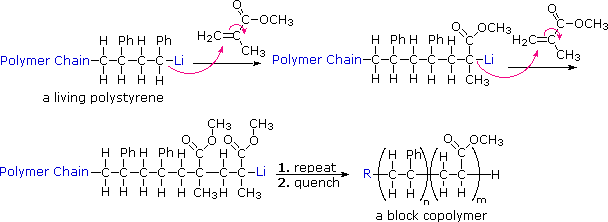Sustainable Polymers: Eco-Friendly Solutions for the Future
Sustainable Polymers: Eco-Friendly Solutions for the Future
Blog Article
Taking Full Advantage Of the Possible of Polymers: Discover the Multifaceted Benefits and Practical Uses
In the huge landscape of product scientific research, polymers stick out as flexible substances that have actually penetrated virtually every aspect of contemporary life. Their application covers different markets, from manufacturing and construction to healthcare and technology. The complex advantages and useful uses polymers remain to develop, offering cutting-edge services to complex obstacles. By checking out just how polymers can boost product resilience, drive sustainability campaigns, transform medical care options, and lead the way for future technological innovations, we can discover a world of opportunities waiting to be taken advantage of.
Relevance of Polymers in Modern Industries
Polymers play a critical function in modern-day sectors, acting as flexible products that drive technology and efficiency across a vast array of sectors. These complicated particles, made up of repeated subunits, have changed sectors such as automotive, aerospace, electronic devices, medical care, and more. In the automobile market, polymers have allowed the growth of light-weight yet durable components, improving gas effectiveness and general performance. Aerospace markets depend on polymers for their high strength-to-weight ratio, important for aircraft and spacecraft building. The electronics market gain from the insulating buildings of polymers, crucial for making circuit boards and digital tools (Polymers). In addition, polymers are thoroughly utilized in the health care industry for drug delivery systems, medical tools, and biocompatible products. Their versatility, toughness, and cost-effectiveness make polymers crucial in contemporary manufacturing processes, cultivating advancements and driving progress in various sectors worldwide. Welcoming the capacity of polymers is essential to unlocking further developments and attending to the progressing requirements of today's commercial landscape.
Enhancing Item Durability With Polymers
With an emphasis on long life and resilience, incorporating advanced polymer innovations into product style has ended up being a keystone of improving durability in contemporary production procedures. Polymers offer a vast array of residential or commercial properties that add to the general longevity of products. One key advantage is their resistance to rust, chemicals, and weathering, making them excellent for usage in various industries where exposure to severe problems is usual.
Moreover, polymers can be tailored to satisfy certain longevity requirements, allowing producers to tailor items according to their intended use and anticipated life-span. By incorporating polymers into product elements, makers can boost strength and impact resistance, reducing the possibility of damage or use with time.
Additionally, polymers are lightweight yet durable, giving sturdiness without including unneeded weight to items. This particular is particularly useful in markets such as aerospace and auto, where light-weight materials are necessary for boosting fuel effectiveness and total efficiency.
Sustainability Advancements Through Polymer Development
In the world of contemporary manufacturing and product style, the ingenious application of polymers is driving considerable improvements in sustainability techniques. Polymer technology plays an essential role in boosting sustainability by offering solutions that reduce environmental impact across various industries. One key facet where polymers stand out is in making it possible for the growth of lightweight yet sturdy products that contribute to sustain effectiveness in transport and minimize overall power consumption. Additionally, the recyclability and biodegradability of particular polymers further advertise sustainable methods by reducing waste and air pollution.
Moreover, developments in polymer modern technology have resulted in the production of bio-based and eco-friendly polymers, stemmed from all-natural resources such as plants, that provide an even more lasting option to conventional petroleum-based plastics. These eco-friendly polymers not only help in reducing her response dependence on nonrenewable fuel sources but also reduce greenhouse gas discharges throughout manufacturing. By incorporating these innovative polymers into manufacturing processes, business can minimize their ecological impact and relocate in the direction of even more lasting techniques, straightening with international initiatives to combat climate change and promote a circular economy.
Polymers in Health Care: Revolutionizing Medical Solutions

Among the key areas where polymers are making considerable strides remains in the advancement of targeted medicine delivery systems. By encapsulating medications within polymeric nanoparticles or micelles, researchers can boost medicine security, boost bioavailability, and make it possible for regulated launch, leading to much more efficient treatment regimens with reduced adverse effects.
In addition, polymers contribute in the field of regenerative medicine, where they are used to create scaffolds that mimic the extracellular matrix, providing assistance for cell growth and cells regrowth. This innovation holds tremendous pledge for fixing damaged organs, advertising injury recovery, and progressing customized medication methods.
Basically, the integration of polymers in health care is driving innovation, boosting treatment efficiency, and ultimately boosting patient end results in ways formerly assumed unattainable.
Future Applications and Advancements in Polymer Technology
Progressing at the forefront of clinical discovery, polymer innovation remains to lead the way for groundbreaking applications and innovations forming diverse markets. In the world of sustainable product packaging, biodegradable polymers are getting More Bonuses traction as eco-friendly choices to typical plastics. These polymers damage down naturally, minimizing the ecological impact of single-use products. In addition, in the field of electronics, conductive polymers are changing wearable technology and flexible electronics. Their distinct residential or commercial properties enable the growth of elastic circuits and sensing units, enabling new possibilities in health care surveillance and clever clothing. Furthermore, polymer nanocomposites are enhancing the mechanical and thermal homes of products, leading to stronger and lighter elements in aerospace and auto sectors. Looking ahead, researchers are exploring the potential of shape-memory polymers for applications in robotics and biomedical gadgets, where materials that can "keep in mind" and return to their initial forms use amazing opportunities for innovation. As polymer technology continues to evolve, the future holds unlimited opportunities for groundbreaking developments across different markets.
Final Thought

Report this page